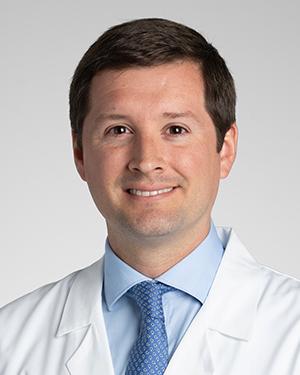Research News
04/02/2025
Award-winning personalized care for joint replacement research based on decade of data
The program provides highly customized guidance pre- and post-surgery to improve patient outcomes.

Dr. Piuzzi in the OR holding a knee joint.

Dr. Piuzzi talks to a patient about their predicted surgical outcomes based on the personalized care tool.

Dr. Piuzzi and the Cleveland Clinic Adult Reconstruction Research team. Bottom row (left to right): Karen Schemmel, Shantina Woods, Nicolas Piuzzi, MD, Jaime Shuster; Middle row: Anabelle Visperas, Laura Stiegel, Debora Bork, Gretchen Hebert, Ignacio Pasqualini; Top row: Shawn Keaveney, Sanalkumar Krishnan, Michael Ramos, Shujaa Khan, Khaled Elmenawi.

Dr. Piuzzi leads a meeting with the Cleveland Clinic Adult Reconstruction Research team.
Nicolas S. Piuzzi, MD, an orthopedic surgeon and researcher, recently won the 2025 Kappa Delta Young Investigator Award for his research on how to improve total hip and knee replacement recovery. Dr. Piuzzi, director of Cleveland Clinic Adult Reconstruction Research and co-director of the Musculoskeletal Research Center, developed a framework that analyzes Patient-Reported Outcome Measures (PROMs) to recommend personalized care that will improve outcomes post-surgery.
PROMs are surveys given to patients that help physicians learn more about the factors influencing their health. In 2015, Cleveland Clinic started collecting PROMs on every elective orthopedic procedure. Armed with almost a decade of information, they then integrated all of the disparate data into an outcome prediction tool that would ensure the most successful post-surgery result possible.
“Patient care is the heart of what we do, but I strongly believe if you’re going to be a good clinician, you need to have research to feed your practice and prioritize education to teach those who work along your side,” Dr. Piuzzi says. “I see a lot of patients every day and in order to be focused, analytical and strategic with our plan, it’s critical to use technology and not rely on antiquated methods.”
Although hip and knee replacements are common and typically successful, 10 to 20% of patients still report persistent pain, functional limitations or unmet expectations one year following surgery. Using the PROMs they collected, Dr. Piuzzi’s team developed a framework for assessing who was at highest risk for poor outcomes. Those identified as high risk have a one in four chance of experiencing a poor outcome, compared to a one in 10 chance in the general patient population.
Using data to determine the need for additional, personalized care
PROMs are valuable data points because information comes directly from the patient, which is especially important when it comes to factors like mental health, pain and overall satisfaction with a procedure. Using the data from the Orthopaedic Minimal Data Set Episode of Care database, Dr. Piuzzi and his team developed a so-called “digital twin” of a patient, a predictive analytics model that predicts such outcomes as the patient’s potential hospital stay and risk of readmission.
The tool is intended to determine a care plan that has the highest probability of success and improved quality of life, based on a decade of information. For example, if a patient has obesity and is a smoker, those are significant risk factors for low success. The system may subsequently recommend a weight loss program for the patient and for them to be counseled on quitting smoking. Or a patient who is flagged with poor mental health may be referred to a mental health specialist to address the underlying issues ahead of time. The system also allows the care team to assess the potential impact of individual interventions.
Dr. Piuzzi says he has heard real-time feedback from patients after surgery that the programs recommended to them as part of their surgery care plan made a significant difference in their overall health and well-being.
“What more could I ask for as a clinician scientist? This is why I do what I do,” he says.
Advocating for patients outside of the OR
Dr. Piuzzi says he originally pursued orthopedic surgery in his home city of Buenos Aires, Argentina because he fell in love with the craft of it – the robotics, the technology and the precise skill involved in the procedures. But making a meaningful, measurable difference of his patients’ quality of life extends past surgery.
In addition to his individual research projects, Dr. Piuzzi recently created the Center of Excellence in Osteoarthritis, a multidisciplinary group of physicians and scientists investigating why osteoarthritis happens in the first place. The effort addresses a pressing need for osteoarthritis therapeutic target discovery. He is also organizing a fundraising walk, the Walk of Joints, which will include many of his patients on the other side of a successful replacement surgery.
“I left Argentina not because I wanted to live in the United States, I moved because I wanted to work at Cleveland Clinic,” Dr. Piuzzi says. “I knew it was an institution that would allow me to flourish and do meaningful work.”
Featured Experts
News Category
Related News
Research areas
Want To Support Ground-Breaking Research at Cleveland Clinic?
Discover how you can help Cleveland Clinic save lives and continue to lead the transformation of healthcare.
Give to Cleveland Clinic